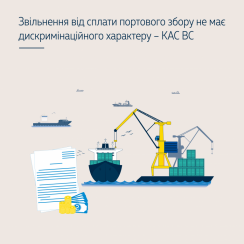Contact center of the Ukrainian Judiciary 044 207-35-46

The exemption from paying the channel due is not discriminatory and does not impose additional financial burdens on the plaintiff.
Such a conclusion was reached by the Administrative Cassation Court within the Supreme Court, after reviewing in cassation the case on the claim of a shipping company against the Ministry of Infrastructure of Ukraine. The plaintiff challenged in court subparagraph 2, clause 1 of the order of the Ministry of Infrastructure of Ukraine dated June 25, 2019, No. 459, according to which paragraph 2 of clause 3.5, Sect. III of the Procedure for Charging and Size of Port Dues Rates (approved by the order of the defendant dated May 27, 2013, No. 316 "On Port Dues") was revised.
Satisfying the claim, the courts of first instance and appellate instance, inter alia, proceeded from the fact that the order created discriminatory conditions for the economic activities of maritime carriers on the basis (criterion) of call of vessels to a foreign port (the implementation of international navigation), there were unreasonably and unlawfully established restrictions on a certain type of economic activity for vessels under the State Flag of Ukraine with the same technical characteristics, namely, the implementation of sea transportation, which is connected with the need to call at a foreign port (international navigation). The courts also came to the conclusion that the defendant's order in the contested part contained signs of discrimination of business entities, unfair competition and restricted the plaintiff's right to carry out international transportation.
The Supreme Court overturned these judgments and adopted a new one, refusing to satisfy the claims in view of the following.
Para. 2, clause 3.5, Sect. III of Order No. 316 (in the wording before amendments by order No. 459 dated June 25, 2019) provides for exemption from channel dues for vessels “that sail under the State Flag of Ukraine by inland waterways within the territory of Ukraine.”
Order No. 459 of June 25, 2019 introduced an exemption from the payment of the channel due for vessels "carrying out coastal navigation". The requirements for the draught and class of vessels for the possible exemption from channel dues have not changed.
Compared to the previous one, the new wording of para. 2, clause 3.5, Sect. III of Order No. 316 introduced an exemption from the payment of channel dues for all vessels engaged in coastal navigation, regardless of which country's flag they sail under (provided they meet the draught and class requirements).
Thus, all vessels, including the plaintiff’s vessels, which meet the draught and class requirements and sail in coastal waters, are exempt from the payment of a channel due.
At the same time, the statutory obligation to pay channel dues has been retained for all vessels engaged in international transportation.
Such a division of vessels into those exempt from channel dues and those not exempt from its payment is clear, with specifically defined features and indicates the same treatment on the part of the state in the issue of collecting and exempting from channel dues.
At the same time, such an exemption applies to a specifically defined category of vessels belonging to different shipowners, and does not apply to individual entrepreneurs, which could put them in a privileged position compared to other business entities.
The arguments of the plaintiff and the conclusions of the courts of the first and appellate instances that the contested order does not correspond to the Maritime Doctrine of Ukraine, contradicts the national interests of Ukraine at sea, creating discriminatory conditions for the Ukrainian shipowner, in particular the plaintiff, when carrying out international sea transportation with calls to foreign ports, are groundless, since the channel due payment benefits introduced by the plaintiff apply exclusively to coastal transportation that does not involve calling at foreign ports. At the same time, the defendant's order does not change the procedure for paying the channel due for international transportation.
In addition, the exemption from the payment of channel dues was introduced not on the basis of residency and the vessel's affiliation to the flag of the state, but on the type of transportation (coastal, international), which are defined by the Merchant Shipping Code of Ukraine and for which separate channel dues are established.
By issuing the contested order, the defendant did not introduce new mandatory payments and did not impose additional financial burdens on the shipowners, including the plaintiff.
In addition, port dues, a type of which is a channel due, and the obligation to pay them by shipowners are provided for by the Code of Merchant Shipping of Ukraine and the Law of Ukraine On Sea Ports of Ukraine, and the defendant is authorized by this Law only to determine their sizes and the Procedure for charging.
Consequently, the adoption by the defendant of the contested order did not affect the plaintiff's obligations to pay the channel dues in international transportation, as such obligations are imposed on the plaintiff by law.
Under such circumstances, the plaintiff's reference to the substantiation of his arguments that, as a result of the defendant's issuance of the contested order, he will be forced to pay a channel due, which, in turn, increases the cost of transportation and makes Ukrainian goods (products) less competitive on the world market, is groundless.
The introduction of the same approach (equally favorable) in the issue of payment of channel dues for vessels sailing under the State Flag of Ukraine and vessels sailing under a foreign flag is in accordance with the provisions of the Association Agreement and the Maritime Doctrine of Ukraine.
The Resolution of the Supreme Court of October 05, 2022, in case No. 640/3513/20 (administrative proceedings No. К/9901/18131/21, К/9901/19592/21) – https://reyestr.court.gov.ua/Review/106716442.
This and other legal positions of the Supreme Court can be found in the Database of Legal Positions of the Supreme Court - lpd.court.gov.ua/login.